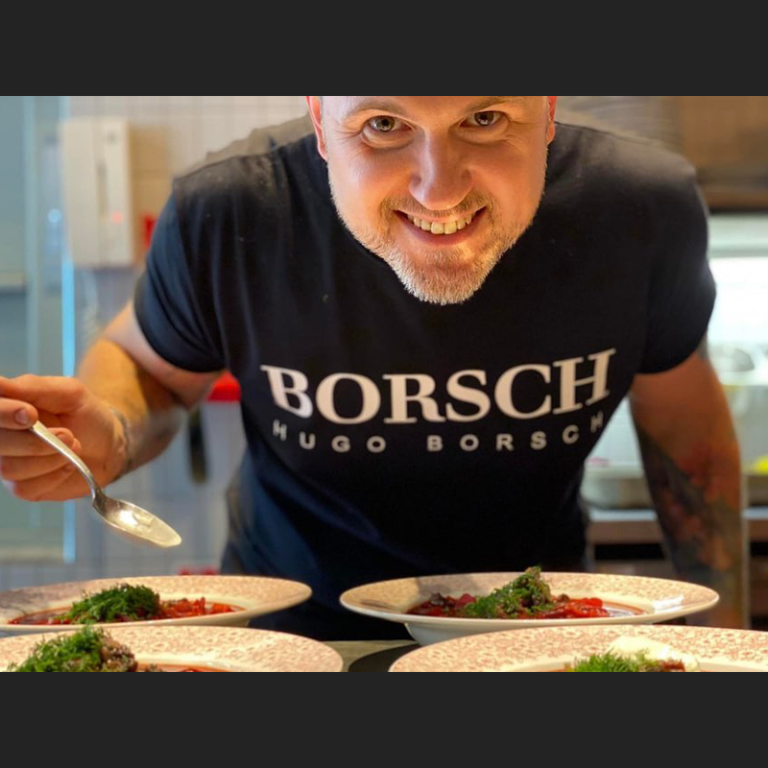
Ukraine’s war for the restoration of its territorial integrity and final liberation from Russian influence continues on many fronts, including gastronomy. Since the first days of the full-scale invasion, “kitchen troops” have been providing food to soldiers, medics, displaced persons, and everyone who needs help. More people in the world are now learning about Ukraine and helping financially, thanks to gastronomic initiatives. Like many other professional communities, Ukrainian food industry workers and volunteers are united to bring Ukraine closer to victory.
The full-scale Russian invasion has influenced the Ukrainian economy enormously. Besides obvious losses in temporarily occupied territories and zones of hostilities, as well as infrastructure damages, many businesses, including restaurants, have shut down or had to lay off their staff. According to the Ukrainian restaurant management company Poster POS, 19% of food establishments continued to operate in Ukraine during the first days of the invasion. This number increased to 74% in July. Cafes, coffee shops, and bars generate 82% of pre-war turnover. However, Ukrainian institutions strive not only to make ends meet and resume operations but also to help those in need during these difficult times.
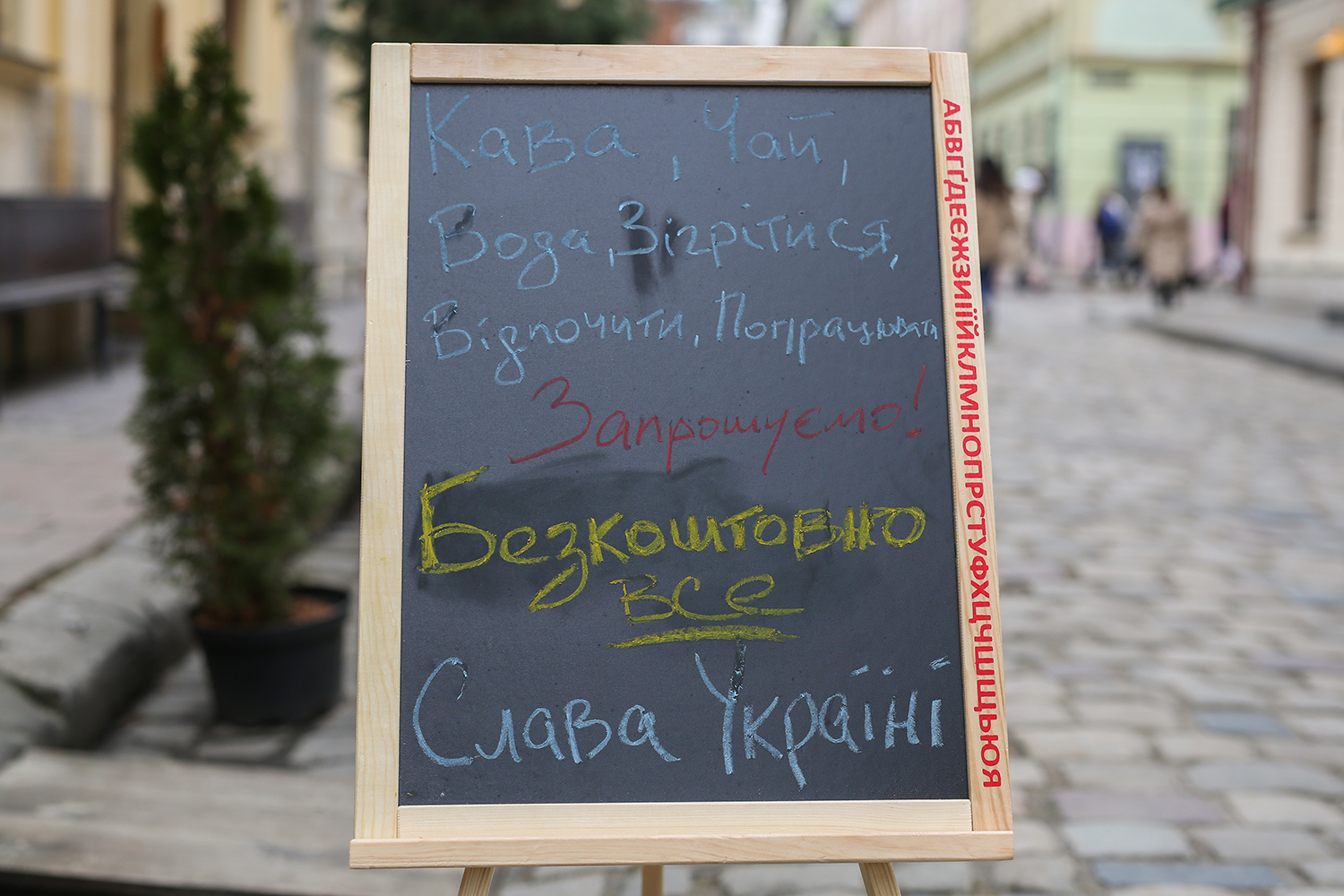
Photo: Yurii Stefanyak.
Feeding the military and internally displaced people
Ukrainian restaurants and coffee shops have adapted to a new reality since the first days of martial law. Some of them started to supply the military and civilians with food for free. Others turned their kitchens into volunteer gastronomic workshops, preparing thousands of meals in a day. For example, the Lviv restoration company Restaron’ gave the servicemen 100 thousand ready lunches in early March. Cofounders of Kyiv Food Market and Molodist together with the founder of Veres united as a team, to cook around 20 thousand meals for the military, Territorial Defence, and hospitals.

Establishments that could not offer full meals sent reserved stocks of their products to those in need. McDonald`s fast food chain suspended operations in Ukraine for security reasons after the invasion had begun, distributing provisions from their warehouses among humanitarian headquarters. Through volunteer organisations, the company started helping Ukrainians suffering from the war in partnership with the Ronald McDonald House foundation. For example, it donates medicine to Ukrainian hospitals. At the same time, Ukrainians are waiting for the resumption of the chain’s work. The Ukrainian office of McDonald’s has already negotiated with the Ministry of Foreign Affairs of Ukraine.
Despite the war, Ukrainian entrepreneurs not only supply food to the military and the rear (the area farthest from the frontlines), but they also launch new projects. Yevhen Klopotenko and Inna Popereshniuk have opened a bistro called “Others” that offers a free menu in addition to the usual one. The Rock’n’Roll sushi and pizza delivery service in Zaporizhzhia and Dnipro have repurposed their establishments. Now they are producing and delivering vacuum-packed food to the war “hot” spots. Moreover, Mariupol pizza chain «Moko pizza» baked around 40-50 pizzas and delivered them to checkpointsas long as it was safe.. After fleeing Mariupol, they continued volunteering. They feed refugees in Dnipro with the support of the organisation “World Central Kitchen”, which covers all expenses. These are just a few examples of people uniting and helping each other, and there are more around the country.
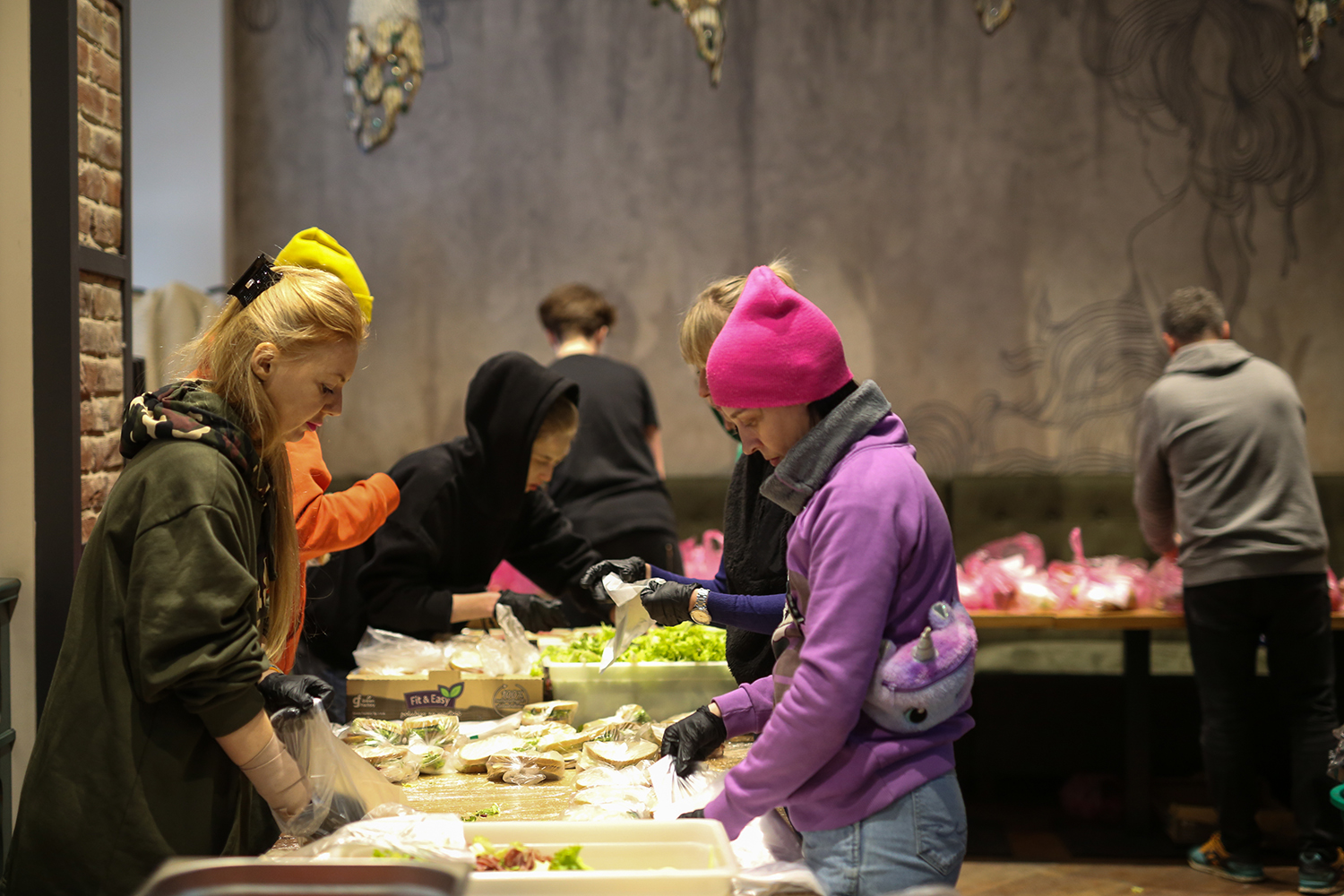
Photo: Yurii Stefanyak.
Suspended coffee has become extremely popular. Anyone that would like to can “suspend” a cup of americano or latte in the establishments that support this initiative. They pre-pay for the drink and one of the soldiers can drink it later. This is how Kyiv bakery Zavertailo treats the Ukrainian military with coffee and pastry. The confectionery company «Honey» offers to support firefighters and doctors in this way. TheFunt Kavy in Dnipro offers suspended coffee for the Armed Forces, Territorial Defence, and also supplies coffee to the local military hospital.

Some restaurants and catering services offer suspendedmeals for the defenders. Restaurateur Dima Borysov has launched an initiative called “pending shawarma for the military”. Anyone can pay for a charity shawarma and doughnuts on the website or through the mobile app. As soon as a batch of 60 portions is assembled, it is prepared and sent to one of the military units operating in Kyiv and the region. The offer was later supplemented with “pending syrnyky” (little cheesecakes).

New agenda-relevant items or situational names have appeared in the menus of various places. Some use them as a marketing strategy to attract customers’ attention. Others say they will transfer the proceeds from selling these particular dishes to the defenders. For example, a charity event, «Food regiment», started in Poltava in April in support of the Armed Forces and Territorial Defence. Local coffee shops and restaurants add dishes with thematic names to their menus. For example, “Bandera deruny” or “ victory-flavoured halushky.”
Not only restaurants or coffee shops are working on the gastronomic front but also volunteers. Lviv Volunteer Kitchen has been operating since 2014 when Russia started the war in the East of Ukraine. Volunteers dried vegetables and packed them for cooking soup or borscht in the field and sent them to the front. With the help of the donor community, the project increased production since the beginning of the full-scale war.

Anna Iankovets and Olesia Yarovska launched a Kolomyia’s borscht social business in Kolomyia. They started a community of dozens of participants who bring products and use them to make borscht and soup preparations for the frontline fighters. The project supports the military and provides jobs for women who moved to Kolomyia from temporarily occupied territories and war zones.
There are also public initiatives that cover the demands on the local level. Professional cooks unite with the volunteers somewhere likeschool cafeterias and cook homemade food for the defenders, such as kovbasa, varenyky, holubtsi, and so on. Internally displaced people often join these initiatives.

Foreign gastronomic community supports Ukraine
The war in Ukraine also touched the world leaders of culinary arts. International companies and businesses working in the food industry left the Russian market massively. Those who stayed or took a neutral position were strongly condemned on social media by proactive Ukrainians and partner countries. Thus, the team of the French culinary guide Michelin stopped its activities in Russia since the beginning of the full-scale invasion. The World’s 50 Best Restaurants award followed its example. The final exit of the fast food chain McDonald’s from the Russian Federation after 30 years of operation became a symbol of the aggressor state’s isolation.
Promotion of Ukraine’s positive image attracts more attention from the citizens of different countries to the the current war and historical context between Ukraine and Russia also occurs through the prism of cooking. For example, a famous Ukrainian chef Yurii Kovryzhenko prepared borscht at a lunch at the Estonian Embassy in Great Britain, turning it into a real performance.
Ukrainians love to treat their friends and allies with borscht, but many Russians have no reason anymore to say that this dish is “an all-Slavic heritage.” UNESCO added the culture of making Ukrainian borscht to the list of intangible heritage on July 1st. The fight for this decision was on even before the beginning of the full-scale Russian invasion. Of course, Russia was not happy with this news. The representative of their Ministry of Foreign Affairs, Maria Zakharova, again spoke about “Kyiv nationalists unwilling to accept shared heritage”.
Most of the invited dinners and master classes on Ukrainian cuisine currently hosted worldwide have a charitable component. For example, chef and culinary writer Olia Hercules and chef Alisa Timoshkina launched the #CookForUkraine flashmob. They invited institutions and individual chefs to prepare borscht, buckwheat, dumplings and doughnuts and, by serving dishes or holding charity events, raise money to help Ukraine.

In addition, a lot of professional communities in the food industry have launched flashmobs to support Ukraine:
#BrewForUkraine — brewers offer themed beer GLORY 2 U, Common Enemy, Bayraktar Dry Stout
#BakeForUkraine — bakers’ movement
#DrinkersForUkraine — association of producers of alcoholic beverages
#FermentForUkraine — selling kimchi and other fermented products
#MakeDrinksNotWar — barmen offered to prepare cocktails
#MakeBorschtNotWar — hashtag of the chef Yevhen Klopotenko, who promotes Ukrainian culinary heritage and calls to support Ukraine.
Many initiatives help Ukraine’s food industry representatives in the career development. The Ukrainian project Chefs for Ukraine is one of the vivid examples. Thanks to international partnerships, it employs Ukrainian displaced female chefs and restaurant industry specialists abroad. The team collects job offers and job requests from those who fled abroad, escaping from war.
Restaurateurs Andrii Mahaletskyi and Artur Lupashko, and marketologist Tetiana Honcharenko implemented a similar social project called HoReCa Angels. The team of volunteers helps Ukrainians who worked in the hospitality industry in Ukraine to find a good job abroad or in the country.
HoReCa
Abbreviation of the words Hotel, Restaurant, Catering. It is a term used by operators and participants in the catering and hotel markets to denote the hospitality industry.
Ukrainian gastronomic initiatives of mutual support
Ukrainian farms also need support since they have no access to their fields due to hostilities and mined land. Moreover, problems with logistics and the possibility of selling their products have emerged; there are not enough fertilisers and animal feed; there is a lack of workers, and so forth. It is now becoming evident to the whole world that Russia is attempting to provoke a global food crisis through the war in Ukraine. Therefore, often farms, unfortunately, are becoming one of the deliberate targets of the invaders.
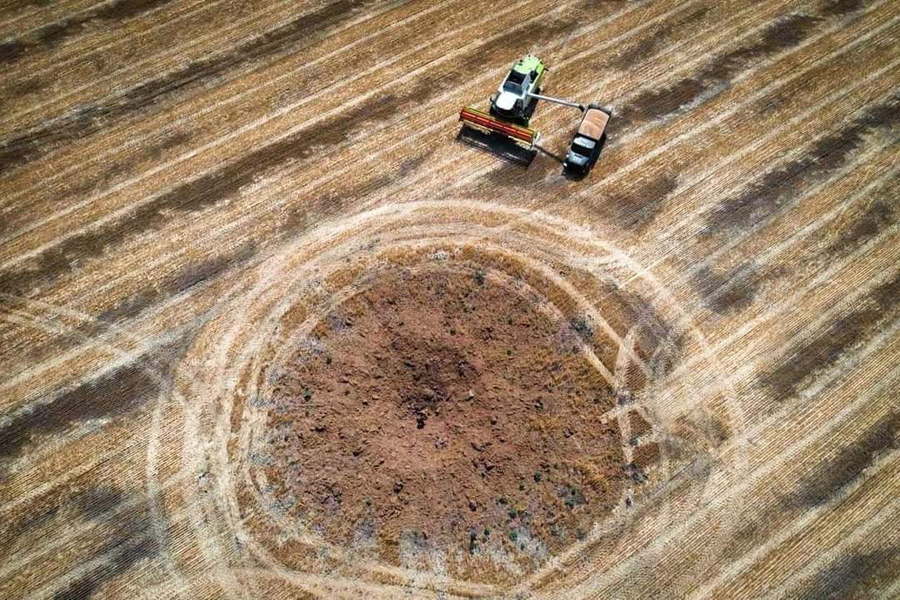
Photo: General Staff of the Ukrainian Armed Forces
The restaurantion industry draw attention to this and to promote local producers. One initiative is called The Victory Menu. Chef Ihor Mezentsev and the community of culinary experts have created a series of Ukrainian recipes using a large number of local products. Restaurants that continue to work in Ukraine are advised to support local farmers by buying their products. Such a solution is also more sustainable as it saves a lot of fuel for transportation. Also, as part of the initiative, charity evenings are arranged. The project keeps raised money in the fund to support small farms and to reconstruct destroyed industries.
To strengthen food security, Ukrainians are advised to cultivate “Victory gardens” — plant low-maintenance vegetables on their own balconies, yards, and so on. This is a widespread practice from the times of the First and Second World Wars, which helped to efficiently use available lands, and to boost people’s morale.
In addition to The Victory Menu, Ihor Mezentsev also organised the Varti initiative. It is a series of culinary evenings hosted by Ukrainian chefs. The participants are united with 3 main things: an interest in Ukrainian cuisine’s traditions, local products, and a desire to support cooks, farmers, and restaurateurs during the war. Ihor organised the first such dinner on July 5th near the famous “100 rokiv tomu vpered” restaurant in Kyiv. He called it “Dodomu” (Coming Home) and compiled the menu with the dishes from his native Kharkiv.
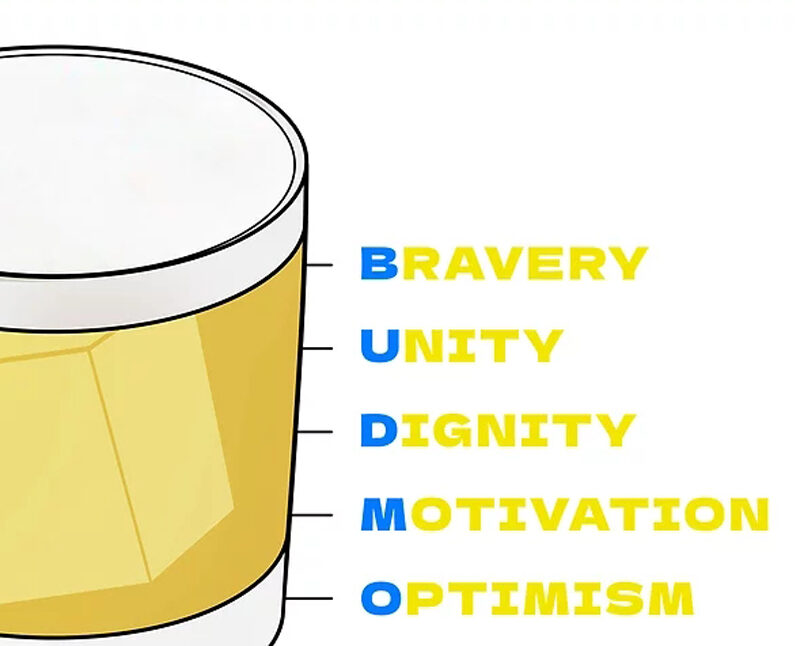
A group of Ukrainian alcohol industry specialists created the BudmoUA. project. Its primary mission is to support Ukrainian restaurants that cook for thousands of people in Ukraine every day. Foreign bars can add a cocktail dedicated to Ukraine to their menu, and transfer any part of the income from its sales to the project through the website to join the initiative. Also, bars of different countries arrange charity events under the name BudmoUA in support of Ukraine.
Ukrainian gastronomic projects, including Original Cuisine Ukrainian, Pani Stefa, Seeds and Roots, Ukrainian Culinary Heritage Project, Practical Cuisine, Zabute i Nove (Lost and New), and A Club of Galician Cuisine, have united to conduct online lectures twice a week. Raised funds are directed to support the Ukrainian Armed Forces. The funds are transferred to the “Lviv Knight” volunteer organisation that specialises in providing the Armed Forces units with high-tech and optical equipment.

A number of Ukrainian restaurateurs and chefs (including Volodymyr Yaroslavsky, Olia Martynovska, Liza Glinska, Vadym Brzezinski, Alisa Cooper, and others) started the charity project “Marathon of Ukrainian Cuisine.” Participants who make any donation on the website get access to live broadcasts or recorded videos with recipes and stories about Ukrainian cuisine. All collected funds are sent to help Ukrainians affected by the war.
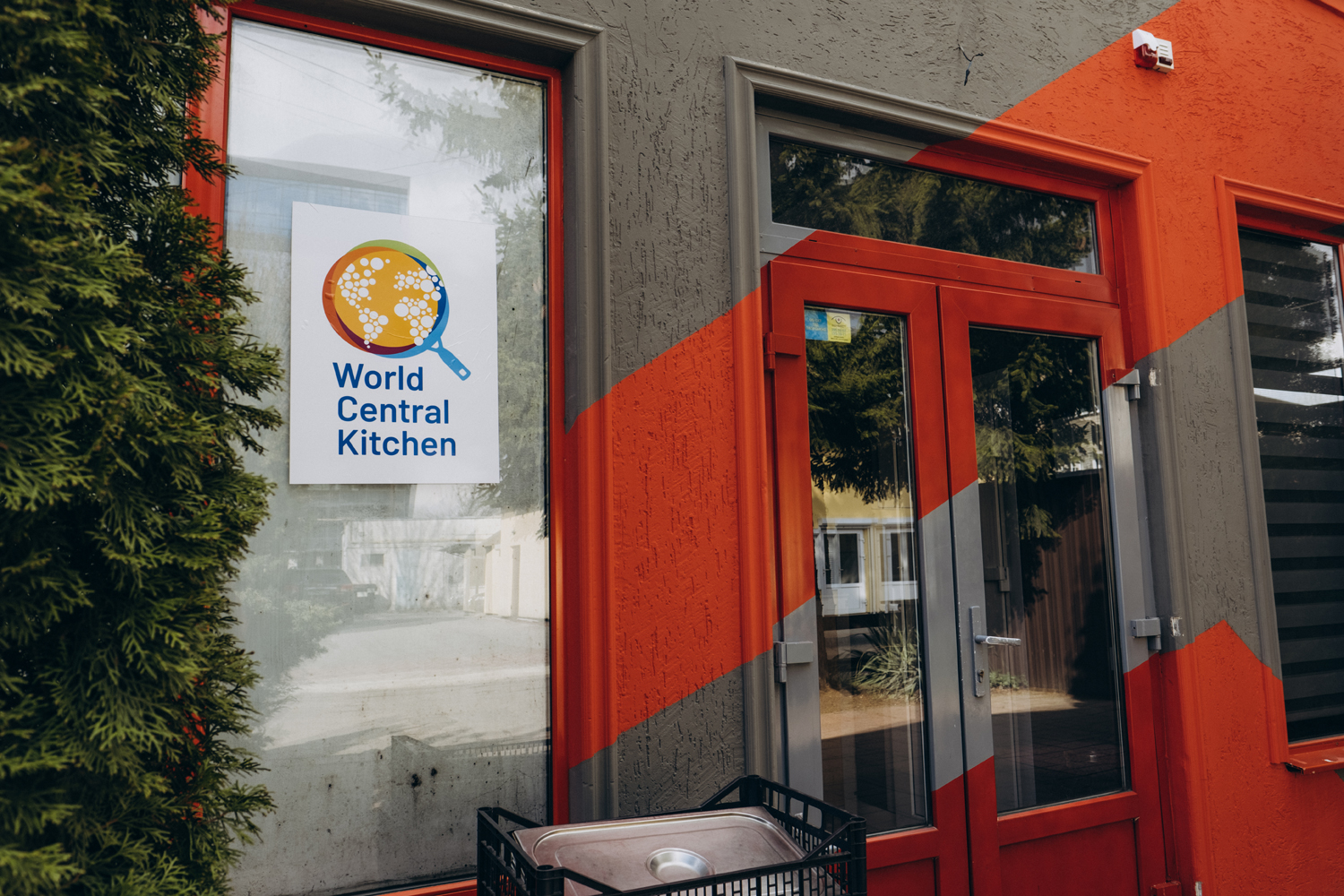
Photo: Sofia Soliar
Volunteer for Ukraine
International NGO World Central Kitchen (WCK) helps people affected by natural disasters with food. The organisation has been working in Ukraine since the beginning of the full-scale Russian invasion. Work began at their headquarters in Lviv in March. Under the vigilant control of chef and restaurateur Jose Andres, the organisation arranges partnerships with Ukrainian restaurants and feeds Ukrainians in need. In more than three months of its activity in Ukraine, WCK managed to expand the area of its operation from the border of Ukraine and Poland to more than 230 settlements of Ukraine and provide more than 25 million portions. World Central Kitchen collects donations on its website and transfer the funds to the offices so they can cover the costs of running the volunteer kitchens and increase their production.

World celebrities donate funds for the WCK humanitarian mission in Ukraine or even come by themselves to volunteer under its auspices. One of the donors is the iconic rock band Metallica, who donated 1 million dollars to Ukraine: five hundred thousand from the band members and the rest from their fans. Hollywood actor Richard Gere sold his collectable convertible, dividing earned 31, 750 dollars between the World Central Kitchen and Open Arms Ukraine charity funds. Film directors Cary Fukunaga and Liev Schreiber joined the WCK charitable foundation and feed the displaced persons at the border or in Ukraine.


On top of stars and large international organisations, ordinary people from abroad like small business owners, philanthropists or those withUkrainian origins also express their support for Ukrainians. For instance, the baker Jacek Polewski came from Poznan, Poland, to the destroyed Bucha near Kyiv to bake bread for locals. He loaded 500 kg of flour in Poland and bought another 600 kg on the way to Lviv. First Jacek Polewski cleaned the premises together with the local bakery Baker’s Hut owners, first and then started baking bread.
The stories from witnesses, volunteers and media show that there is a place for kindness and mutual support even in dire life circumstances (such as occupation, hostilities, blockade, urgent evacuation, humanitarian crisis, etc.). Ukrainians, who managed to flee their houses without haste, distribute food supplies to their neighbours. Those who meet displaced people in safer regions prepare them sandwiches, pastries and other dishes. People support not only each other in this way but also Ukrainian defenders, constantly giving them supplies of provisions or homemade food. There are a lot of such examples. Even if some aren’t public, they will remain in the memory of people who experienced it firsthand.
Food, on the one hand, is a basic daily need, but on the other hand, it is one of the easiest and most effective ways to show care. It is something that unites people of different nationalities, statuses and outlooks, a kind of key to understanding each other. An American historian Timothy Snyder also reminds us of the political aspect of the «kitchen subject», when it becomes an additional tool of influence and control. In the case of the Russian-Ukrainian confrontation, food is also one of the apparent proofs of how Ukrainians are able to unite and help each other, and tell the world about themselves.

